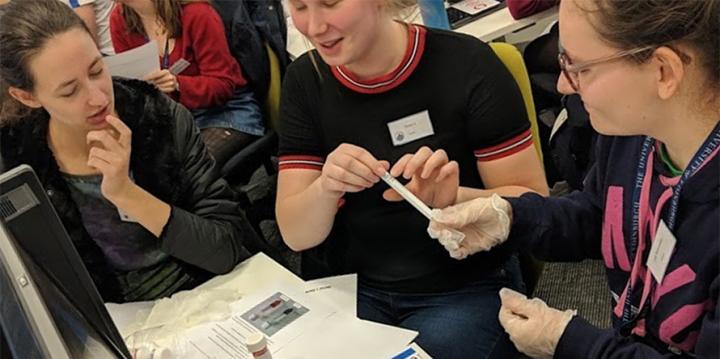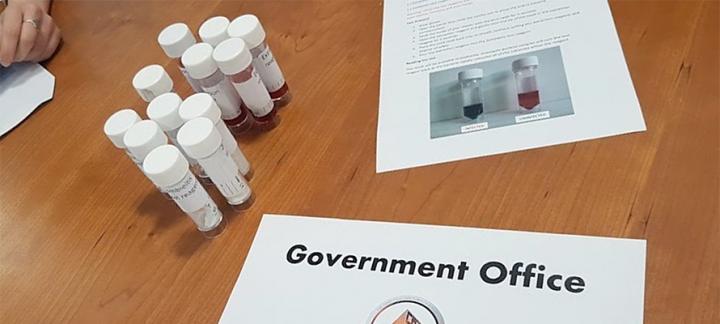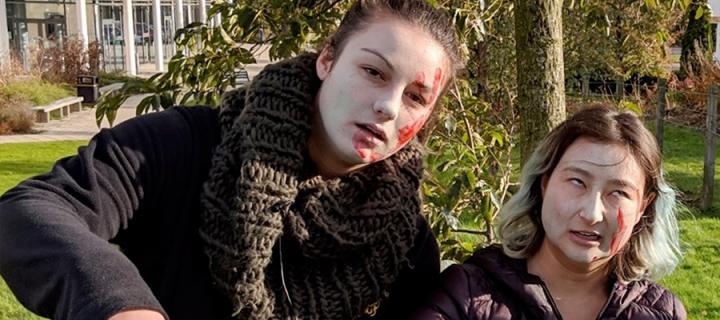Night of the living vets: Learning through play in veterinary education
Senior Lecturer in Student Learning Jessie Paterson talks about the role play has in embedding resilience in first year veterinary students
The undergraduate veterinary degree (Bachelor of Veterinary Medicine and Surgery, or BVM&S) is a five-year qualification for students coming straight from school. At the Royal (Dick) School of Veterinary Studies, the first year of learning for these students is focused on building foundational skills in terms of theory, clinical and professional skills.

Working under pressure
“The veterinary profession is a challenging one,” explains Jessie Paterson, Senior Lecturer in Student Learning, “and one of the really important things for us to communicate to our students is how to deal with the sorts of pressures and disappointments that can occur in real life veterinary practice.”
Students come to the School with a lot of successes under their belt. They’re often top in their class, with a strong commitment to their studies and solid extracurricular experience. They are, by selection, exceptional individuals. So how can the teaching team prepare them to deal with failure?
“A few years ago, we were looking at our Professional & Clinical Skills course and considering how we might effectively embed a range of professional skills to first-year vet students, including dealing with difficult situations, negotiation and dealing with failure,” says Jessie. “Crucially, we wanted to do something that would be engaging and enjoyable, and provide the students with memorable takeaways.”
Zombie survival

Jessie was introduced by a colleague to Lecturer in Veterinary Science Education Jill MacKay, whose interest in learning through play made her the perfect candidate for collaboration. “Jill had some fantastic ideas about how we could deliver these lessons through play, and an idea began to evolve around a zombie survival game in which students would experience a crisis that required them to think on their feet.”
The planning stages involved creating the game itself and working out how to logistically make this run as a class. Jill created an intricate, story-based narrative to drive the lesson forward and a range of characters who would set the scene. In order to add a touch of realism, Brian Mather of the Vet School’s Digital Education Unit was tasked with producing suitably disturbing video dispatches from the infected zone, along with other visuals to help create an immersive environment for the students.
“In 2018 we had our first cohort run the scenario,” says Jessie. “We had developed an idea that featured the nearby village of Roslin, in which it was the last stronghold in a zombie attack. We thought the students would have fun with that!”

The setup was simple: four rooms, each with four volunteer helpers from the fourth-year cohort and one staff member overseeing a group of 20-30 first year students. In each room, the group played through the scenario using the prompts and events provided to them and made decisions on what to do as each stage of the game unfolded.
To win the game, groups had to survive the zombie apocalypse – but each student also had a personal goal to achieve based on their randomly assigned character.
Session outcomes
“It was incredible watching the differences in the way each group handled the same set of circumstances,” says Jessie, “It unfolded very differently in each room. One group even decided to emigrate to Canada!”
After two hours in their groups working through the scenarios, the wider cohort came back together for a debrief and lecture on reflection and coping with failure. Reflecting on what they’d learned, the students were overwhelmingly positive about the session, reporting outcomes that went beyond the original brief, such as persuasion and working as part of a team. “I had doubts at the start, but this exercise was fantastic,” said one student in their anonymous feedback. “It really makes you think how these skills would be useful in practice,” said another.

Due to the success of the session, it was incorporated into the first year curriculum. “It’s fantastically important that students develop skills in resilience and working as part of a team from an early stage, and learning through play enables this to happen in a fun and practical way,” says Jessie. “The take-home lessons from the session become embedded in all work that follows, and that’s learning at its best.”
Find out more about the BVM&S programme: https://www.ed.ac.uk/vet/studying/undergraduate


